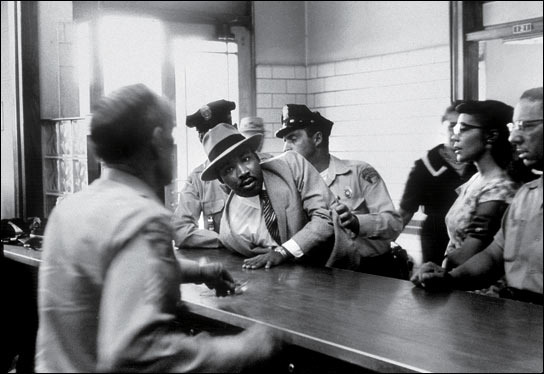Editors' Note: MLK, Social Justice and Art

Martin Luther King, Jr. was a skilled orator and writer. He was not born this way. No one is born this way. Such mastery of language and persuasion takes years of practice and dedication. It was in his childhood in the segregated Sweet Auburn neighborhood of Atlanta that Dr. King was taught how to command language and use it to persuade. His father, also a minister and civil rights leader, would insist his children (King, Jr. among them) speak up at the dinner table and contribute to family discussions. It was through these discussions and, later, through an engaged reading of the Bible and other classical texts at Boston University that Dr. King would develop his skill.
In 1963 (on Good Friday), King, along with other protesters, was arrested in Birmingham, Alabama. Here, he wrote his impassioned and literarily significant "Letter from a Birmingham Jail." In this letter, Dr. King argues that non-violent direct action is necessary for bringing about justice. Specifically, he states: "there is a type of constructive, nonviolent tension which is necessary for growth. Just as Socrates felt that it was necessary to create a tension in the mind so that individuals could rise from the bondage of myths and half truths to the unfettered realm of creative analysis and objective appraisal, so must we see the need for nonviolent gadflies to create the kind of tension in society that will help men rise from the dark depths of prejudice and racism to the majestic heights of understanding and brotherhood."
The tension necessary to bring about justice, Dr. King argues, is the same tension necessary to bring about "creative analysis and objectivity appraisal." Here, Dr. King is arguing that tension is good and necessary. Tension is the thing that forces us to scrounge up the best of ourselves and have a positive impact on this world. Tension forces us to come to greater understanding and to act upon this understanding. It was the tension of his childhood -- both the external tension of the segregated Jim Crow South and the internal tension of engaging with his father -- that made Dr. King the skilled orator, writer and leader that he was.
As we celebrate Martin Luther King, Jr. Day, we should think about the tensions in our lives and our art and use them to gain greater insight into and mastery of our craft. This is the path to a socially just and significant art.
 Monday, January 16, 2012 at 10:20AM
Monday, January 16, 2012 at 10:20AM
Reader Comments